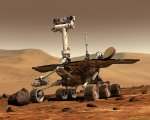NASA’s Mars Exploration Rover Project will pass a historic Martian longevity record today. The solar powered Opportunity rover will beat the duration record set by NASA’s Viking 1 Lander in November 1982 of six years and 116 days operating on the surface of Mars.
While Opportunity’s twin, Spirit, commenced operating on Mars three weeks prior to Opportunity, no communications have been received from Spirit since March 22. The amount of sunlight hitting the robot’s solar panels declined during autumn on Mars’ southern hemisphere, forcing it into hibernation. Problems with Spirit’s mobility prevented NASA from positioning the robot into a more favourable position for generating electricity.
If Spirit resumes communication after coming out of hibernation, it will attain the Martian surface longevity record.
The robots were designed only for a 90-day mission on the surface of Mars and are now well into their sixth year. Spirit and Opportunity may have more life in them yet as the solar panels on both rovers should gradually generate more electricity as Winter Solstice, the shortest day of the year, has now passed on Mars.
Under ideal conditions, the rovers solar panel arrays generate approximately 140 watts of power for up to four hours per sol (a Martian day). Each rover requires around 100 watts to drive. The rover power system includes two rechargeable lithium ion batteries weighing just over 7kg each. The solar power systems have had to contend with major dust storms and temperatures ranging from −40C to +40C.
The record for longest working lifetime by a spacecraft at Mars belongs to NASA’s Mars Global Surveyor, which operated in orbit around Mars for more than 9 years after arriving in 1997. NASA’s Mars Odyssey, in orbit since in 2001, is on track to take the Mars orbit longevity record late this year.












































